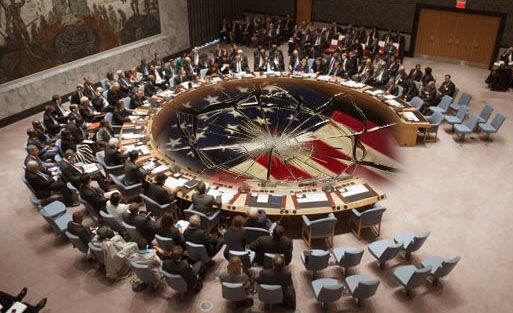Kourosh Ahmadi said the US letter addressed to the Security Council on reinstating sanctions on Iran was sent failing to foresee reaction of the international community including the opposition by 13 of its members.
He said the 21 September letter by Kelly Craft, the US Ambassador to the UN, describes conclusions drawn by the Trump administration to trigger the snapback mechanism and outline expectations from the UN member states without the need for consensus among Security Council members.
Various dimensions of the US letter
Ahmadi said the US letter could be examined in three dimensions.
“The letter outlines a summary and abstract of the US stances on the so-called snapback mechanism and Kelly Craft reiterates the justifications of the Trump administration on the US entitlement to trigger the mechanism. The US is claiming it has the right to notify the Security Council of a significant non-compliance by Iran according to Paragraph 11 of the UNSCR 2231.”
He said the US ambassador has claimed in the letter that former UN resolutions have been reinstated against Iran as there has been no counter-resolution during the time frame set in paragraph 12 of the JCPOA to continue abolishing those resolutions.
“She also claims that paragraphs 11 to 15 of UNSCR 2231 do not mention the necessity of reaching consensus among the Security Council members to trigger snapback.”
Ahmadi added that the American ambassador surprisingly does make any reference to the significant reasons presented by the 13 members of the Security Council against the US measure to reinstate UN resolutions.
“And that is the cessation of US participation in the JCPOA and the subsequent illegitimacy of the US resort to the mechanisms of an agreement it has pull out.”
Ahmadi said the second dimension of the letter includes a summary of sanctions described in the past six resolutions on sectors such as services, nuclear items, missiles and conventional weapons.
“In this respect. The American official claims all countries are obligated to enforce these sanctions.”
Referring to the other dimension of the US letter, the international affairs expert said the US expects other countries to illegally confiscate assets of Iranian individuals and institutes as per resolution 1737 and prohibit travel of some Iranian officials as per resolution 1803. Other sanctions, according to the US letter, include seizure of prohibited items, denial of service to the ships carrying prohibited items, exercising extra caution on trade with some Iranian individuals and institutes.
Ahmadi said the US has further claimed that the United Nations Secretariat, following the re-imposition of former UN resolutions, should adopt necessary measures to reinstate former resolutions and set up the so-called Sanctions Committee and relevant boards formed under resolutions 1737 and 1929. It also claims that under the new circumstances, measures considered under paragraphs 7, 8, 16 to 20 of UNSCR 2231, such as the role of a facilitator for a UN Security Council member, should immediately terminate.
US neglect of reaction by the international community
Ahmadi said it is astonishing that the US letter completely ignores the reaction of the international community including the opposition of 13 UNSC members.
“These 13 countries avoided officially and in writing the recognition of the US measure right from the beginning. The EU3 reiterated its position in and official letter to the Security Council president.”
Referring to the remarks of the Russian foreign minister and his emphasis on the impossibility of reinstating sanctions against Iran by the US, Ahmadi said Russian authorities have rejected in numerous interviews the possibility of sanctioning Iran’s conventions arms deal with other countries as of October 18.
“Under such circumstances, it is expected that the issue of reimposing former UN resolutions against Iran will remain a big problem in the Security Council and for the international community until the Trump administration is in power.”
He said the US considers former UN resolutions re-instated against Iran while insisting on their implementation according to a recent executive order by Trump.
He added that Americans will face a lot of problem with other countries and the Security Council in their efforts to reimpose and enforce former UN resolutions against Iran. They will follow up their request for reviving sanctions and establishing the expert committee.
“We may witness tension and event threats of cutting US fund for the UN as the Secretary General has rejected the US justifications while the US continues to mobilize all its capacity and hegemony to convince others to follow its wrongful policies.”
Ahmadi said cooperation in the Security Council particularly among the five permanent members will be overshadowed should the US continue to press for its illegal demand.
US political and legal failure
Ahmadi said the majority of the big players in the Security Council is opposed to re-instating sanctions against Iran from the legal point of view, adding that the Secretary General of the UN has ruled out the possibility of pursuing sanctions which have already been lifted as per the provisions of UNSCR 2231.
“The United States, under these conditions, is isolated politically and legally. However, the US is a superpower and owns the world’s largest economy. What remains to be seen is the extent to which multinational companies and international banks are keen and obligated to enforce illegal sanctions against Iran and face US secondary sanctions. In particular, we should wait and see whether the US will act to stop ships carrying Iranian produce in international waters in line with Paragraph 15 of the already abolished UNSCR 1929. in which case it will face a decisive reaction by Iran and should assume the responsibility of its repercussions.”










0 Comments